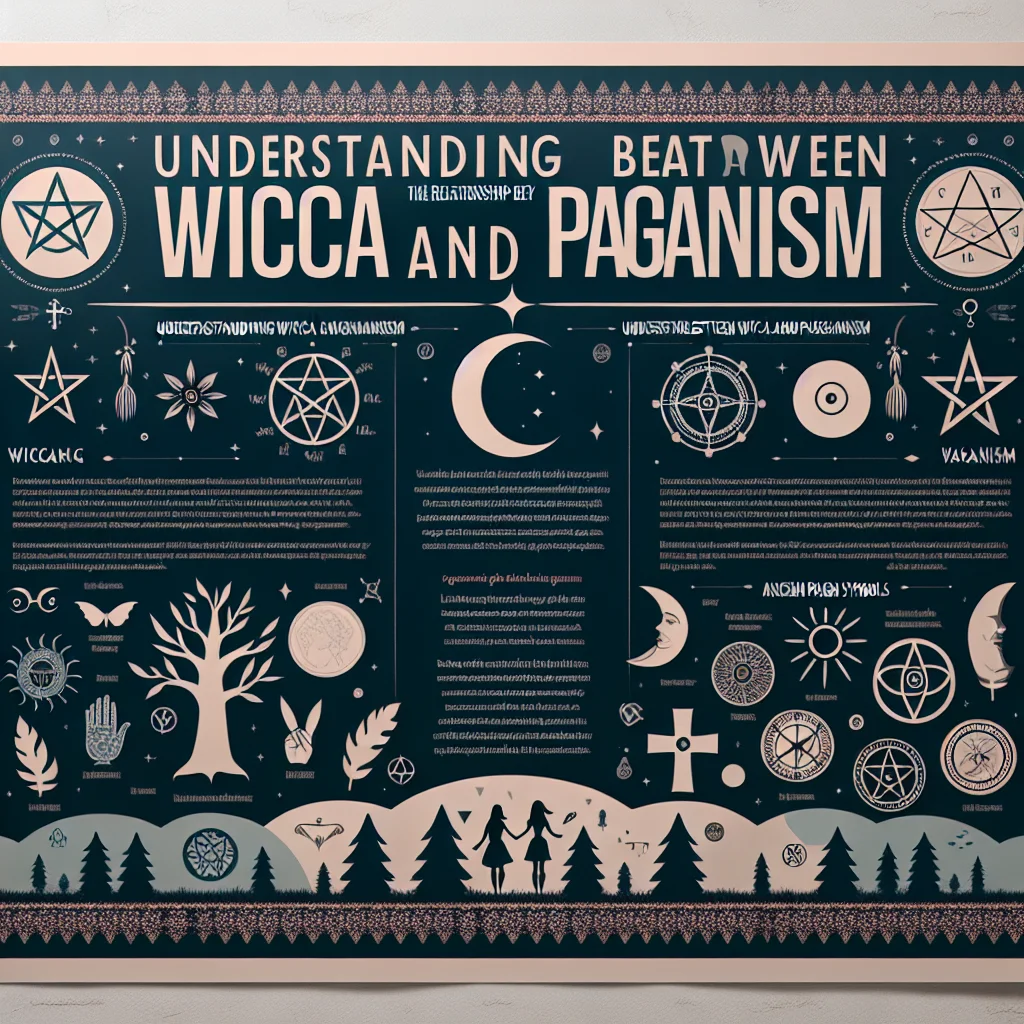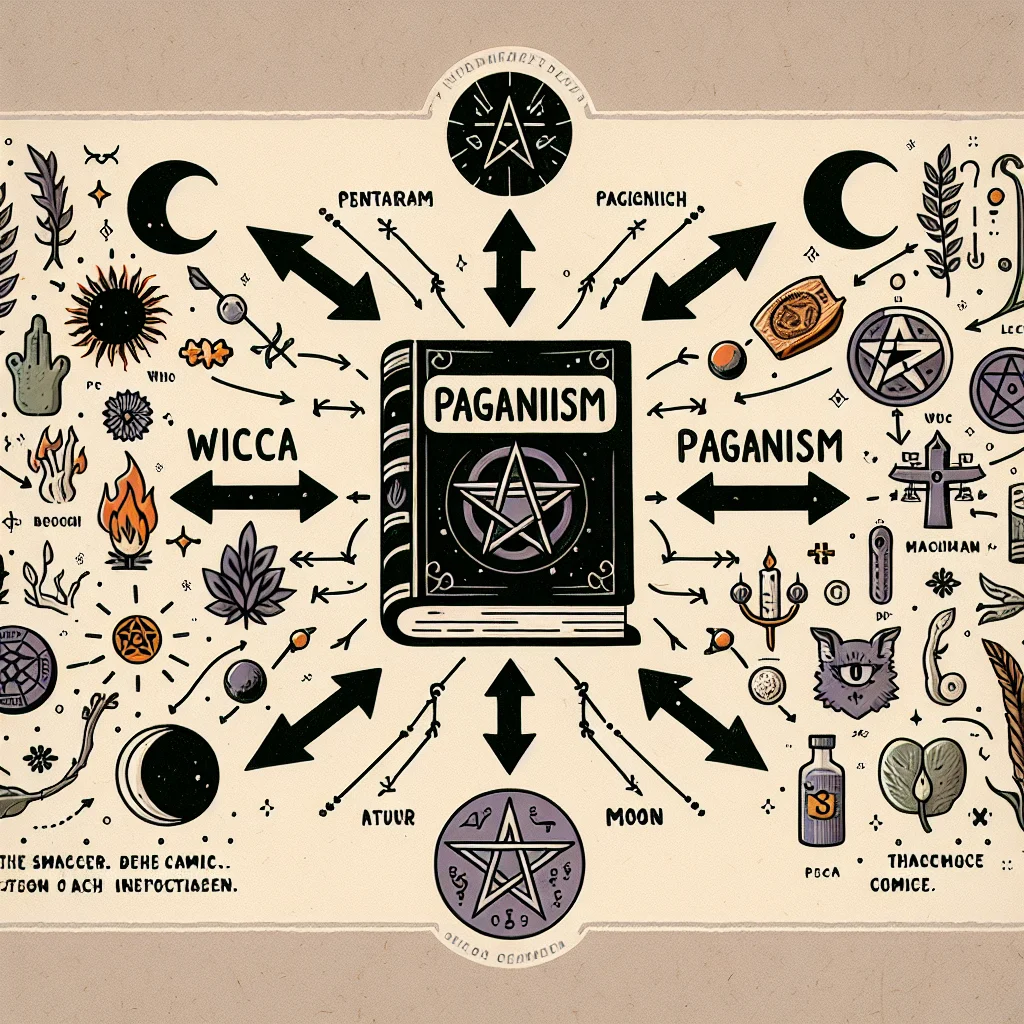As an Amazon Associate I earn from qualifying purchases.

Wicca, recognized as a modern religion initiated in the mid-20th century, draws upon various ancient pagan practices and beliefs. At its heart is a reverence for nature and an adherence to a form of paganism, which is a term broadly encompassing numerous religious traditions outside the main world religions, especially those that predate the Abrahamic faiths of Judaism, Christianity, and Islam.
The roots of Wicca are often traced back to the early 1950s in England, with a man named Gerald Gardner being credited as the “father of Wicca.” Gardner introduced Wicca as a positive, nature-centric faith system, influenced heavily by older pagan customs, folklore, and witchcraft, but with unique rituals and beliefs. Wicca quickly spread and evolved, forming various traditions. It gained significant international traction with an increasing number of adherents who identified as Wiccan, substantially contributing to the global pagan community.
One compelling statistic that underlines the growth and significance of Wicca within the broader pagan framework is that the American Religious Identification Survey of 2008 found Wicca had grown faster over the previous decade than any other religion in the United States. In contemporary times, the Wiccan belief system is often characterized by its duotheistic worship of a God and a Goddess, its celebration of seasonal festivals known as Sabbats, and its emphasis on a moral code encapsulated by the Wiccan Rede (‘An it harm none, do what ye will’).
The connection between Wicca and the wider umbrella of paganism is a topic of interest for many involved in the neopagan community. Some practitioners of Wicca self-identify as pagans, recognizing the shared heritage and similar value placed on polytheism, nature worship, and ritual practice. Moreover, Wicca’s growing acceptance has paved the way for open discussions about religious diversity and has fostered a broader societal acknowledgement of pagan traditions as legitimate and enduring belief systems.
Fascination with Wicca and paganism as a whole is further highlighted through modern media portrayal and the rising popularity of pagan-oriented festivals, where participants often blend various magical traditions, and Wiccans play a significant role. These events serve not only as spiritual and religious gatherings but also as places where cultural exchange takes place, allowing Wiccans and other pagans to connect, learn, and celebrate their shared and diverse paths.
html
Is Wicca a Form of Paganism? Understanding the Relationship
Wicca is indeed a subset of the broader category known as Paganism. Paganism refers to a group of religions and spiritual practices based on pre-Christian traditions and beliefs, often tied to nature worship and polytheism. Wicca, on the other hand, is a modern, nature-based religion that draws inspiration from these older pagan practices. It emphasizes the worship of the Goddess and the God, the cycle of the seasons, and the practice of magic. By identifying as Pagans, Wiccans align themselves with a spiritual heritage that honors the Earth and its cycles, yet they have their unique rituals, deities, and practices that distinguish them within the Pagan umbrella. As we delve further into the subject, we will explore the intricate traditions of Wicca, how they correlate with broader Pagan values, and what sets Wiccan practices apart from other Pagan paths.
Are Wiccans Pagan? Exploring the Connection
When investigating the spiritual landscape of modern religious practices, one is likely to come across the terms “Wicca” and “Paganism.” A prevalent question that emerges in these spiritual circles is: are Wiccans pagan? The concise answer is yes, Wiccans are generally considered to be pagan, but there is more complexity and nuance to this connection that warrants further exploration.
Wicca as a Subset of Paganism
Wicca is a modern, nature-based religion that was developed in the first half of the 20th century. It is fundamentally pagan because it falls under the broad umbrella of Paganism, which is a term used to describe religious traditions that are polytheistic or pantheistic and often incorporate beliefs or practices from indigenous and historical polytheistic religions.
Paganism covers a multitude of spiritual paths, each with its own distinct practices and theology. Wicca, however, stands out due to its more organized system of belief and practice, which typically revolves around the worship of a Goddess and a God, observance of the Wheel of the Year (a cycle of seasonal festivals), and the practice of magic.
The Origins and Beliefs of Wicca
Gerald Gardner, a British civil servant and amateur anthropologist, is credited with founding Wicca in the 1940s and 1950s. He presented it as a modern revival of ancient witchcraft practices. Wicca borrows from older pagan traditions, such as Celtic and Norse spirituality, as well as from occult and esoteric schools of thought like Thelema and ceremonial magic.
Wiccans hold diverse beliefs, but most share common practices such as ritual magic, a reverence for nature, and a pantheistic or polytheistic worldview. Wiccan rituals often involve casting a circle, invoking elemental directions, and celebrating esbats (moon rituals) and sabbats (seasonal festivals). Wicca’s ethical framework is often summarized in the Wiccan Rede, which states “An it harm none, do what ye will,” emphasizing personal responsibility and harmlessness.
Pagan Diversity and the Place of Wicca
While Wicca is part of the Pagan family, not all pagans are Wiccan. Paganism encompasses a rich diversity of paths, including but not limited to, Druidry, Heathenry (Germanic Paganism), Hellenism (Greek Paganism), and many others that do not follow Wiccan rites or acknowledge Wiccan beliefs.
Wicca’s relationship to the broader pagan movement is sometimes viewed from different angles due to variations in belief systems and rituals. However, the interconnectivity within the Pagan community often allows for shared spaces and dialogues between Wiccans and other pagan practitioners, contributing to a larger, interwoven spiritual tapestry.
Cultural Impact and Demographic Growth
The cultural impact of Wicca is noticeable in its influence on media, literature, and broader pop culture, contributing to an increased public interest and understanding of Pagan beliefs. This visibility has, in turn, led to a rise in the number of people identifying as Wiccan or Pagan.
Demographically, Wicca has seen significant growth in recent decades. While exact numbers are challenging to determine due to the private nature of many practitioners and the decentralization of the religion, estimates suggest that there could be upwards of a million people practicing Wicca or Wiccan-influenced spirituality across the world today. According to the Pew Research Center’s 2014 Religious Landscape Study, 0.4% of Americans identify as Pagan or Wiccan, a statistic that reflects the notable presence these spiritual paths have in modern religious practice.
Q1: Is Wicca a form of Paganism?
A: Yes, Wicca is considered a form of modern Paganism. It is a specific religious path that falls under the broader umbrella of Paganism, which encompasses many different nature-based faiths.
Q2: Can you be Wiccan without being Pagan?
A: Typically, being Wiccan is associated with being Pagan since Wicca is a subset of Paganism. However, some people may identify with Wiccan practices or beliefs individually without adopting the broader Pagan label.
Q3: Are all Pagans Wiccan?
A: No, not all Pagans are Wiccan. There are many other Pagan paths and traditions outside of Wicca, such as Druidry, Heathenry, and various forms of reconstructionist Paganism.
Q4: What distinguishes Wicca from other Pagan religions?
A: Wicca has its own unique set of beliefs, practices, deities, and rituals. It often focuses on the worship of a God and a Goddess and observes a series of Sabbats and Esbats that mark the changing seasons and lunar cycles.
Q5: Do Wiccans practice witchcraft?
A: Many Wiccans do practice witchcraft as part of their spiritual path, but practicing witchcraft is not a requirement to be Wiccan. Moreover, not all people who practice witchcraft identify as Wiccan or Pagan.
Q6: How did Wicca originate, and is it an ancient religion?
A: Wicca is a relatively modern religious movement that was developed in the early 20th century by figures such as Gerald Gardner. While it is inspired by ancient pagan beliefs and practices, Wicca itself is not an ancient religion.
Q7: Is there a difference between Wicca and Neo-Paganism?
A: Neo-Paganism is an umbrella term that covers various contemporary Pagan religious movements, including Wicca. Wicca is a specific tradition within Neo-Paganism.
Q8: What religious texts do Wiccans follow?
A: Wiccans do not have a central sacred text like some other religions. They may use a variety of texts for inspiration, including the “Book of Shadows,” which is a book of rituals and spells customarily passed down or created by practitioners.
Q9: Can one be both Christian and Wiccan?
A: While historically, Christianity and Wicca have distinct and different belief systems, some individuals may choose to explore or combine elements from both paths. This personal spiritual blend is sometimes referred to as Christian Wicca or Christo-Paganism.
Q10: How do Wiccans view the concept of God and the divine?
A: Wiccans generally believe in a dualistic concept of divinity, worshipping both a Goddess and a God. These deities may be viewed as literal beings, symbolic archetypes, or facets of a greater divine force.

Conclusion
The exploration of the connection between Wicca and Paganism has led to the understanding that Wiccans are indeed considered Pagans due to their polytheistic and nature-centered beliefs, which align with the broad definitions of Paganism. While Wicca is a specific and modern religious movement initiated in the mid-20th century, its roots can be traced back to ancient pre-Christian traditions and practices, which it actively incorporates. This relationship highlights the diversity within Paganism and the distinct identity that Wicca has developed over time. By celebrating the Wheel of the Year, honoring a Goddess and God, and engaging in rituals that resonate with Pagan values and deities, Wiccans affirm their place within the Pagan umbrella, despite their unique traditions and the structured framework of their belief system.
However, it is important to recognize the multiplicity within Paganism that allows for varied interpretations and practices among its adherents. Wiccans are Pagans, but not all Pagans are Wiccans. This distinction is crucial in understanding the wide spectrum of beliefs and ritual practices that constitute contemporary Paganism. The voluntary association of Wiccans with the Pagan community showcases a sense of solidarity and shared values with a larger spiritual community, but it should not overshadow the distinctive nature of Wicca as a standalone religion. As Paganism continues to evolve, the relationship between Wiccans and the broader Pagan context is expected to foster a dynamic interplay of belief, custom, and tradition.
Amazon and the Amazon logo are trademarks of Amazon.com, Inc, or its affiliates.
Continue Your Magical Journey
Free Witchcraft Starter Kit
Get 6 free printable PDFs: grimoire pages, moon calendar, spells, crystals, herbs, and tarot journal.
We respect your privacy. Unsubscribe anytime.
Enhance Your Practice
As an Amazon Associate, I earn from qualifying purchases.

